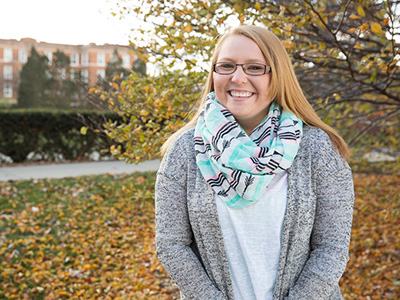
About an hour after Jenna Stutz had arrived at the elementary school in Cape Town, South Africa, where she was to spend a week last summer working with South African instructors, one of the teachers handed Stutz a science textbook.
“You are the teacher this afternoon,” he told the Elmhurst junior.
Stutz, who had no idea she was going to be leading the class on her first day in the school, managed to improvise her way through the afternoon’s lessons. And each day for the rest of the week, the process repeated itself, with the teacher asking Stutz to prepare a lesson plan on short notice, then handing the class over to her to implement it.
“He knew I wanted to work with the students, and he wanted to push me a little,” Stutz explained. “He wanted to show me that I could do it.”
Stutz was one of nine Elmhurst students who spent two weeks working in and around Cape Town as part of a course called South Africa: Service and Interdisciplinary Study, led by Professor Therese Wehman of the education department, Professor Nancy Lee of the religious studies department and Adjunct Professor Oliver Lawrence, a native of Cape Town.
Stutz called the class “life changing.” The Elmhurst education major had been interested in teaching very young children, but her South African experience opened her eyes to some of the joys of working with students in upper grades.
“Those kids changed my heart. They taught me more than I taught them,” said Stutz, who is now observing classrooms in a public school on Chicago’s South Side. “I’ve been given the confidence to know that I can do it. It was such a positive experience.”
This summer marked the eighth time a group from Elmhurst had traveled to Cape Town as part of the class. Elmhurst students who make the trip serve South African children in schools, daycare centers and sites run by non-profit organizations. Though their temporary quarters are among the glassy skyscrapers and tourist sites of Cape Town, their work takes them into the poverty-stricken townships just a few miles away, where thousands live in makeshift shacks. Even after studying social conditions in South Africa as part of their pre-trip preparation, students can be taken aback by the poverty they encounter.
“No matter how much research you do, it doesn’t really prepare you for what you see,” Stutz said. “You see people living in places made of scraps of metal, and the reality hits you.”
Megan Holmes, a junior psychology major, spent a week helping to feed people in need at a center in Delft Township run by the Mustadafin Foundation. She peeled potatoes, prepared red beans and rice in enormous vats, and distributed meals to hundreds of people who depend on the foundation’s services.
“There would be 300 people lined up with buckets or whatever they could find to get food for their families,” Holmes recalled. “It was shocking, crazy to see how much need there was. But we also saw how grateful and kind everyone was. There were so many smiles.”
Her sister, Molly Holmes, also a junior psychology major, worked with disabled children at SARDA, an organization that offers riding lessons for people with disabilities at their equestrian center in a comfortable suburban section of Cape Town. Holmes said the contrast with the poorer townships was impossible to miss. “It was like visiting two different worlds. It was such a stark contrast,” she said. “To see such pervasive poverty, such great need, you just want to learn more about what you can do to help, in however small a way.”
While in South Africa for the course, students write every day, as part of the process of reflecting on and learning from their experiences.
“They learn what it’s like to work and teach in a different culture. And they find out that, whatever the differences, kids are kids,” Wehman said. “It’s a really powerful experience.”
The South Africa course is just one of several international service-learning courses led by Elmhurst faculty. Wehman and Mick Savage, Elmhurst’s director of service-learning, have collaborated on research that seeks to measure the impact of such courses on students. In one project, they investigated how teachers in schools in Australia, Jamaica, England, South Africa and the United States educate “at-risk” students, hoping to identify educational best practices. Wehman said findings from the project have helped shape Elmhurst’s international service-learning courses.
“Having this kind of research lends some validity to what we’ve been telling students when we describe the benefits of these courses,” she said. “It’s wonderful work.”
And, as Wehman’s students will testify, it can be profoundly impactful.
Stutz recalled the way the South African students tried to teach her to speak a bit of Xhosa, their famously complex tonal Bantu language. Even when she struggled to reproduce the clicking consonants that are part of the language, the students urged her to keep trying.
“It was like I was the teacher and the student at the same time, and I found that so affirming,” she said. “I was so comfortable in a place where I should have felt uncomfortable.”